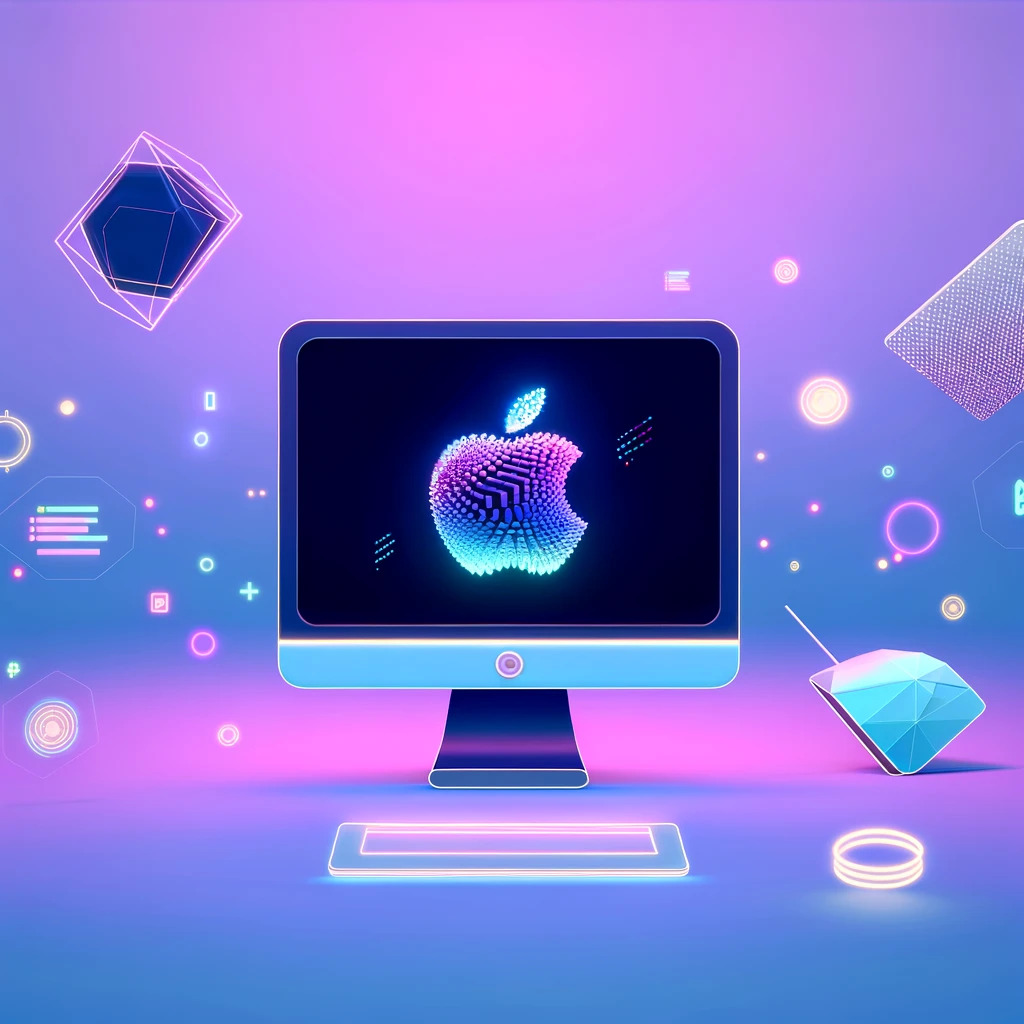As Apple’s Worldwide Developers Conference (WWDC24) steadily approaches, the global tech community is on the edge of its seat, anticipating a series of announcements that have the potential to push the boundaries of what’s possible in app development, artificial intelligence (AI), and smart home integration. Each year, WWDC serves as a showcase for Apple’s innovative spirit and its commitment to shaping the future of technology. This year, expectations are set particularly high, with the tech giant poised to reveal groundbreaking advancements.
Among the anticipated highlights are Swift Quantum, a pioneering initiative to bring quantum computing within the grasp of everyday app development, and AI Composer, a tool poised to transform the way developers bring ideas to life through code. Additionally, enhancements in ARKit 5.0 promise to bring about a new era of augmented reality experiences, while iOS 18 is rumored to introduce a more intuitive and anticipatory user interface than ever before. Moreover, a significant update to HomeKit could redefine our interaction with smart home technologies, making Apple’s ecosystem more integrated and versatile. As we stand on the cusp of these potential revelations, let’s delve deeper into the innovations that could mark WWDC24 as one of the most pivotal events in Apple’s history.
Swift Quantum: The Quantum Leap for Swift
Swift Quantum represents not just an incremental update but a monumental leap forward for the Swift programming language. By seamlessly incorporating quantum computing functionalities into its framework, Swift is set to become the first major programming language to make quantum computing accessible to a wide array of developers. This integration heralds a new era where the extraordinary computational prowess of quantum mechanics can be leveraged to solve complex algorithms, simulate intricate systems, and process data at unprecedented speeds, all within the familiar realm of Swift development.
For developers, the implications of Swift Quantum are profound. With this update, tasks that require immense computational resources, such as cryptography, drug discovery simulations, and complex data analysis, could be executed with significantly greater efficiency. Developers will be able to design apps that tap into quantum algorithms for enhanced performance in areas like machine learning model training, financial modeling, and more, without needing to be experts in quantum physics themselves. This democratization of quantum computing promises to accelerate innovation across various fields, enabling Swift developers to lead the charge in creating next-generation apps that were previously beyond the scope of traditional computing paradigms.
By integrating quantum computing into Swift, Apple is not only enhancing the capabilities of its developer community but also ensuring that its ecosystem remains at the cutting edge of technology. Swift Quantum could transform the landscape of app development, ushering in a future where the line between science fiction and practical application becomes increasingly blurred.
AI Composer: Bridging Ideas and Implementation
AI Composer is poised to revolutionize the way we think about app development. By converting plain English descriptions into functional Swift code, it bridges the gap between conceptualization and implementation, potentially democratizing app creation like never before. This groundbreaking tool leverages advanced artificial intelligence to understand natural language inputs, analyze the intent and desired functionalities, and then meticulously generate the corresponding Swift code. This means that even those without traditional coding skills could bring their app ideas to life, opening up a world of innovation to a broader audience.
For seasoned developers, AI Composer could significantly streamline the development process, reducing the time spent on coding foundational elements and allowing more focus on refining user experiences and integrating innovative features. By automating the generation of boilerplate code, developers can rapidly prototype and iterate on their ideas, accelerating the pace of development without compromising on quality or functionality. Moreover, this tool could serve as an invaluable learning aid for aspiring developers, offering real-time translation of ideas into code and thereby deepening their understanding of programming concepts and Swift syntax.
AI Composer represents a shift towards a more inclusive, efficient, and creative approach to app development. It embodies Apple’s commitment to empowering individuals to create, innovate, and bring their unique visions to the vast ecosystem of iOS and macOS applications. By blurring the lines between idea generation and technical implementation, AI Composer is set to become an essential tool in the arsenal of developers and visionaries alike, fostering a new wave of apps that are as diverse and dynamic as their creators.
ARKit 5.0 with Neural Interface: A New Dimension of Interaction
ARKit 5.0, with its innovative Neural Interface, stands on the brink of redefining augmented reality (AR) interaction, offering a seamless blend of digital and physical realms through the sheer power of thought. This next-level technology promises to transform the AR landscape by enabling users to manipulate and interact with digital content in an entirely intuitive and unprecedented manner. By harnessing neural sensors to interpret user intent and translate it into actions within AR environments, ARKit 5.0 could offer a truly immersive and hands-free user experience, making it a groundbreaking update for developers and users alike.
The potential applications of ARKit 5.0’s Neural Interface are vast and varied. In gaming, it could lead to more immersive experiences, where players navigate and interact with virtual worlds using their thoughts, creating a deeper sense of presence and engagement. In education, it could offer novel ways to explore complex concepts through interactive models that students control with their minds, enhancing understanding and retention. For professionals working in design, architecture, and engineering, the ability to manipulate 3D models and simulations through thought alone could streamline workflows and foster creativity.
Moreover, this advancement could significantly benefit accessibility, offering new avenues for interaction for those with limited mobility. By eliminating the need for physical controllers or touchscreens, ARKit 5.0 could make technology more inclusive, allowing more users to benefit from the enriching experiences AR can provide.
As developers gain access to ARKit 5.0 and its Neural Interface, we can expect a surge of innovative apps that leverage this technology to create experiences previously confined to the realm of science fiction. This update not only highlights Apple’s ongoing commitment to pushing the boundaries of what’s possible with technology but also sets a new standard for interactive experiences, further cementing AR’s role in the future of digital interaction.
iOS 18 with Predictive UI: Anticipating Every Move
iOS 18, with its rumored introduction of Predictive UI, promises to herald a new era of user-device interaction, where your iPhone or iPad not only understands your habits but anticipates your needs, tailoring its behavior in real-time for a more seamless and personalized experience. This breakthrough feature, powered by sophisticated machine learning algorithms, aims to analyze usage patterns and preferences to predict and adapt to the user’s next move, effectively making the device an extension of the user’s intent.
Predictive UI could redefine the way we interact with our devices, making them not just tools but proactive partners in our daily routines. For instance, if you habitually check the weather and your calendar first thing in the morning, iOS 18 might display this information on your lock screen as soon as your alarm goes off. Or, if you often toggle your smart home lights and play soothing music before bed, your device could suggest these actions as your usual bedtime approaches, simplifying your nightly routine with a single tap.
Beyond just convenience, Predictive UI has the potential to significantly enhance accessibility, offering users with different abilities a more accommodating and efficient way to navigate their devices. By predicting user actions and preferences, iOS 18 could reduce the need for complex gestures or navigation, making technology more accessible to everyone.
For developers, this leap in UI intelligence opens up new avenues for app design and functionality. Apps could integrate more deeply with iOS, participating in a holistic ecosystem that anticipates and responds to user needs in concert. This could lead to apps that are not only more intuitive to use but also more integral to the user’s daily life, embedded in the fabric of their personalized iOS experience.
As we edge closer to WWDC24, the excitement around iOS 18 and its Predictive UI feature builds. If these rumors hold true, Apple may be setting the stage for a future where our devices understand us better than ever before, simplifying our lives and enriching our interaction with technology in profound ways.
HomeKit Revolution: The Smart Home Redefined
The upcoming iteration of HomeKit is poised to redefine what we expect from a smart home ecosystem. Speculation surrounding the HomeKit Revolution suggests an expansive upgrade that could transform every corner of our living spaces into a seamlessly connected, intelligent environment. By broadening its compatibility to include a wider array of home appliances—from refrigerators and ovens to blinds and security systems—HomeKit aims to become the quintessential nerve center of the modern home, offering unparalleled control and customization.
This update is rumored to introduce AI-driven personal assistants that go beyond simple voice commands, integrating deeply with household routines and preferences to provide a level of automation and personalization previously unseen in the smart home domain. These assistants could learn from daily patterns to optimize energy usage, enhance security, and even make meal preparation easier by suggesting recipes based on what’s available in your smart refrigerator.
The HomeKit Revolution could also bring about advanced features such as mood-based lighting adjustments, temperature settings that adapt to the weather and individual preferences, and even anticipatory music selection to enhance your home atmosphere. Imagine walking through the door to be greeted by a perfectly lit environment, your favorite music playing softly in the background, all adjusted to your current mood and the time of day.
For developers, the HomeKit Revolution opens up a vast playground for innovation. The opportunity to design apps and devices that integrate with Apple’s smart home ecosystem could lead to the creation of more intuitive, useful, and interconnected experiences within the home. Developers might create solutions that predict and respond to the needs of the household, offering suggestions, automations, and interactions that feel like magic.
As anticipation for WWDC24 builds, the potential of the HomeKit Revolution sparks the imagination: a future where our homes are not just connected but are truly smart, anticipating our needs and responding to our lives in ways that make everything just a bit easier, a bit more comfortable, and a lot more intuitive. Apple’s vision for the smart home is bold, and if these updates come to fruition, they could firmly place Apple at the forefront of the smart home revolution, changing how we live our lives within our homes.
As the countdown to WWDC24 ticks away, the tech community is abuzz with speculation and excitement over what could be Apple’s most ambitious leap forward in recent memory. From the potential introduction of Swift Quantum, bringing the realm of quantum computing into the hands of app developers, to the revolutionary concept of AI Composer transforming ideas into code, and the groundbreaking advancements in ARKit 5.0 and iOS 18—Apple is poised to redefine our interaction with technology on multiple fronts.
These advancements hold the promise of not only empowering developers with more sophisticated tools and capabilities but also of significantly enriching the user experience through more intuitive, personalized, and interactive technologies. The potential expansion of HomeKit could transform our living spaces into truly smart homes, seamlessly integrated and responsive to our needs. This year’s WWDC could very well mark the beginning of a new era where our relationship with technology is more immersive and intertwined with our daily lives than ever before.
As we look forward to the unveiling of these groundbreaking innovations at WWDC24, the excitement is palpable. These developments could set new standards in technology, pushing the boundaries of what’s possible and opening up a world of opportunities for users and developers alike. The future, it seems, is just around the corner, and it’s shaping up to be a fascinating place. What do you think of these potential announcements? Are you as excited for WWDC24 as we are? Let us know what you think.


